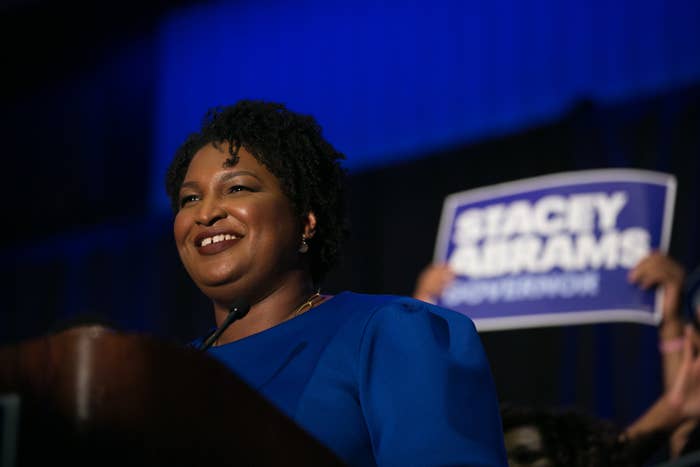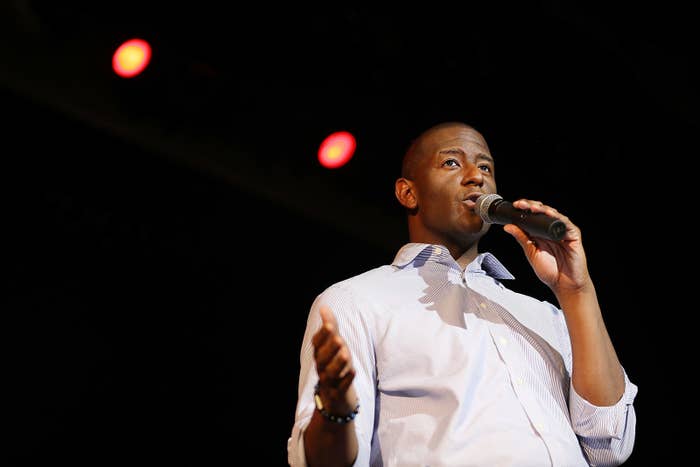
If Beto O’Rourke could lose his 2018 race but still be considered a top-tier candidate for president, where is the 2020 excitement for Stacey Abrams or Andrew Gillum, who lost their races in a similar fashion?
That question has been bouncing around national Democratic politics since November, and has only gotten louder since O’Rourke officially announced his candidacy. Abrams, whose reception at a recent black women’s empowerment event in Las Vegas led one national Democrat to observe to BuzzFeed News that she’d be silly not to at least look at a White House campaign, apparently isn’t taking it off the table. Gillum has also flirted with the idea.
But regardless of their ultimate 2020 decisions, both politicians are moving ahead with their own plans, determined not to miss their moment and to keep their priorities at the center of Democratic politics.
Gillum on Wednesday will introduce a plan to register a million new voters in Florida in order to give Democrats a leg up in 2020, seemingly passing on his own run. A Gillum spokesperson said they were expecting “several hundred” people to attend his Wednesday announcement. And Abrams has been thanking her 2018 volunteers and keeping them apprised of her plans, which she says she’ll decide on by April, all while promoting a new voting rights group, Fair Fight Action.
Unsuccessful candidates typically fly off the radar, almost never diving headfirst into statewide political efforts unattached to candidacy for statewide office. But Abrams and Gillum are both set on creating new paths to political engagement for a younger, more progressive and multiracial coalition, after seeing the Democratic establishment neglect those voters for years.
The two have a close relationship, and their futures are linked: Next week, they'll appear on a panel on gerrymandering and voter suppression at the Bloomberg Equality Summit in New York City.

Abrams and Gillum are the new Democratic political realities in their states. Gillum in 2018 got over a million votes more than Charlie Crist did when he ran in 2014. And while 1.1 million Democratic votes were cast for both Jason Carter and Michelle Nunn in their 2014 races for governor and US Senate, more black Georgians alone voted for Abrams in 2018. “This,” said one Georgia Democrat, “is what Stacey means when she says she and her movement actually won.”
In their campaigns, Abrams and Gillum each made strong arguments for how they would lead differently; Abrams spent gobs of money on the ground finding her voters in places she needed to dominate, and Gillum employed a direct style of campaigning against a Trump acolyte. By competing everywhere, they drew crowds in unexpected places, and the relentless activity of their campaigns helped down-ballot Democrats who typically need a bigger boost in nonpresidential years. Their candidacies developed essential political infrastructure, an effort that fell by the wayside during the Obama era.
A former top aide to Abrams traced her status as a Democratic phenom back to her establishment of the New Georgia Project, a voter registration effort that is not unlike Gillum’s new “Forward Florida” initiative he’s expected to launch Wednesday. Abrams “created an electoral house” as candidate for governor, the aide said. The New Georgia Project was “the concrete frame” of that house, registering hundreds of thousands of new voters and turning them out in 2018; Fair Fight Action is the roof, he said, “protecting democracy from all the suppressive efforts.”
Abrams “created a template to give Democrats across the country a chance to win elections,” the aide said. “The only question is: Will she build them for herself?”
There is some speculation within Democratic circles about the timing of her meeting earlier this month with Joe Biden, and whether or not Biden pitched Abrams on the idea of joining a potential ticket as his running mate. Abrams, who wrote in her political memoir of her plans to one day run for president, recently tweeted that 2020 was back on the table.
Abrams is also being encouraged by Washington Democrats, including Senate Minority Leader Chuck Schumer, to run for the US Senate seat up in 2020 currently occupied by David Perdue. She’s considering that, too. “I need to run for the right job,” she told supporters recently. “I don’t need to run just because someone says there’s a race. You run when you’re the right person and it’s the right time, and my responsibility is to figure out what that is.”
Warning that they were not aware of what decision Abrams intended to make, two people who said they have spoken to Abrams in recent weeks said they were skeptical that Abrams would tie herself to a presidential candidate this early after giving such careful consideration to her race for governor in 2018. They said that one of the things about her close loss is that it has illuminated electoral reform, one of her signature issues and now something House Democrats are focused on. Similarly, the two people were unclear about why Abrams would change course to pursue a legislative seat where she’d be a junior member and 1 of 100 after working for close to a decade in order to become an executive.
“Stacey Abrams running for US Senate is more of a benefit to the party than it is to Stacey Abrams, and we should make no mistake about that.”
One top Democrat told BuzzFeed News that “Stacey Abrams running for US Senate is more of a benefit to the party than it is to Stacey Abrams, and we should make no mistake about that.” But that move is the preferred route for people who believe her name on the ballot is the Democrats’ best shot at picking up an elusive seat in the Senate and for keeping her movement active and engaged. In a piece titled "Dear Beto, Andrew, and Stacey — Run Again" the Democratic political activist Steve Phillips made the case that they should run again, in their states.
Phillips — who recently announced his support for Cory Booker in the Democratic primary — told BuzzFeed News, “While it may be personally intoxicating to run for president, truly transforming the country requires looking at the big picture of building power in the states such as Georgia, Florida, Texas, and Arizona that are going through demographic transformation. Abrams and Gillum should be saluted for their post-election plans to build robust civic engagement operations in their respective states.”
Abrams is also launching an organization called Fair Count to focus on the 2020 census and ensure undercounted populations are fairly represented. “The mismanagement of Georgia’s elections was particularly egregious, but this is a nationwide issue. Fair Fight is a leader in the fight for voting rights in Georgia, and we look forward to working with allies from Florida to North Dakota and beyond to end the scourge of voter suppression in our country,” Fair Fight CEO Lauren Groh-Wargo said in a statement to BuzzFeed News.
“When you’re a person running for, say, the US Senate, you naturally have a bigger megaphone for the kind of reforms Abrams wants in Georgia, but Abrams is no ordinary political talent,” said Kimberly Peeler-Allen, a cofounder of Higher Heights for America, a group working to elect black women to elective office that was heavily involved with Abrams’ campaign. “Using the infrastructure awareness she’s brought to the activism, she’s woken up not just Georgia but the entire South and there’s a lot that can be done when people realize they have the power to direct policy and that they don’t have to accept the status quo.
“The influence she has is not something that just goes away because she’s not running for office.”
She added that black women who are running for office are looking closely at Abrams’ approach as a model, a sign of recognition from tacticians and candidates that her formula for how to mobilize and run a campaign is worth taking note of, even though she came up short.
It’s not just black women paying attention, either.
“My campaign for US Senate is being built on the foundation they established,” said Jaime Harrison, who is exploring a bid for US Senate to unseat Lindsey Graham. “Stacey and Andrew have fundamentally changed the lens in which Democrats view African American statewide candidates and Democratic Party politics in the South. They have demonstrated that Democrats can compete when our candidates are authentic and their campaigns mobilize and energize the party’s base while simultaneously reaching out to other communities.”
“My campaign for US Senate is being built on the foundation they established.”
Gillum’s speech planned for Wednesday in south Florida was never expected to be an announcement for president, but his team did not exactly shy away from the speculation after releasing a glossy, campaign-style video previewing Gillum’s speech.
As news of Gillum’s plans came out Wednesday morning, the Florida Democratic Party also announced a $2 million voter registration effort, committing to registering 200,000 voters before the 2020 Democratic presidential primary. But just as the New Georgia Project riled Democratic establishment types in Georgia dating back to its founding in 2014, two sources close to Gillum told BuzzFeed News that Gillum’s team had not expected the FDP’s announcement, with one source saying they were “blindsided.” Although one Florida political strategist said there was “definitely tension” in the party, Juan Peñalosa, the executive director of the FDP, told BuzzFeed News, “it's important that folks know that our announcement today is a part of the joint effort by Democrats...to create the electorate we need to win in Florida including Gillum,” whom he called “one of the more exciting leaders of our Party in Florida.”
Gillum’s political team points to his Florida primary campaign as proof of the former Tallahassee mayor’s diligence. Throughout the summer of 2018, leading up to Florida’s late-August primary, he won support by talking about exciting voters who would vote Democratic down the ballot; he spoke about how if he won, Democrats in competitive races could hitch their wagon to his momentum, boosted by a wave of black voters, and, most of all, flipping Florida Gator-blue. This next move is part of a trajectory Gillum began in the early 2000s, moving from a student organizer to an official on the Tallahassee City Commission.
Kevin Cate, a close Gillum aide, said that Gillum and Abrams understand the responsibility that comes with transformational change. Even if they don’t wind up running now for specific offices, he said they both understand that there’s a power in prioritizing movements over moments. He likened their attitude — the attitude about being the infrastructure — to the spirit of a quote by James Baldwin. “Not everything that is faced can be changed, but nothing can be changed until it is faced,” he said.
